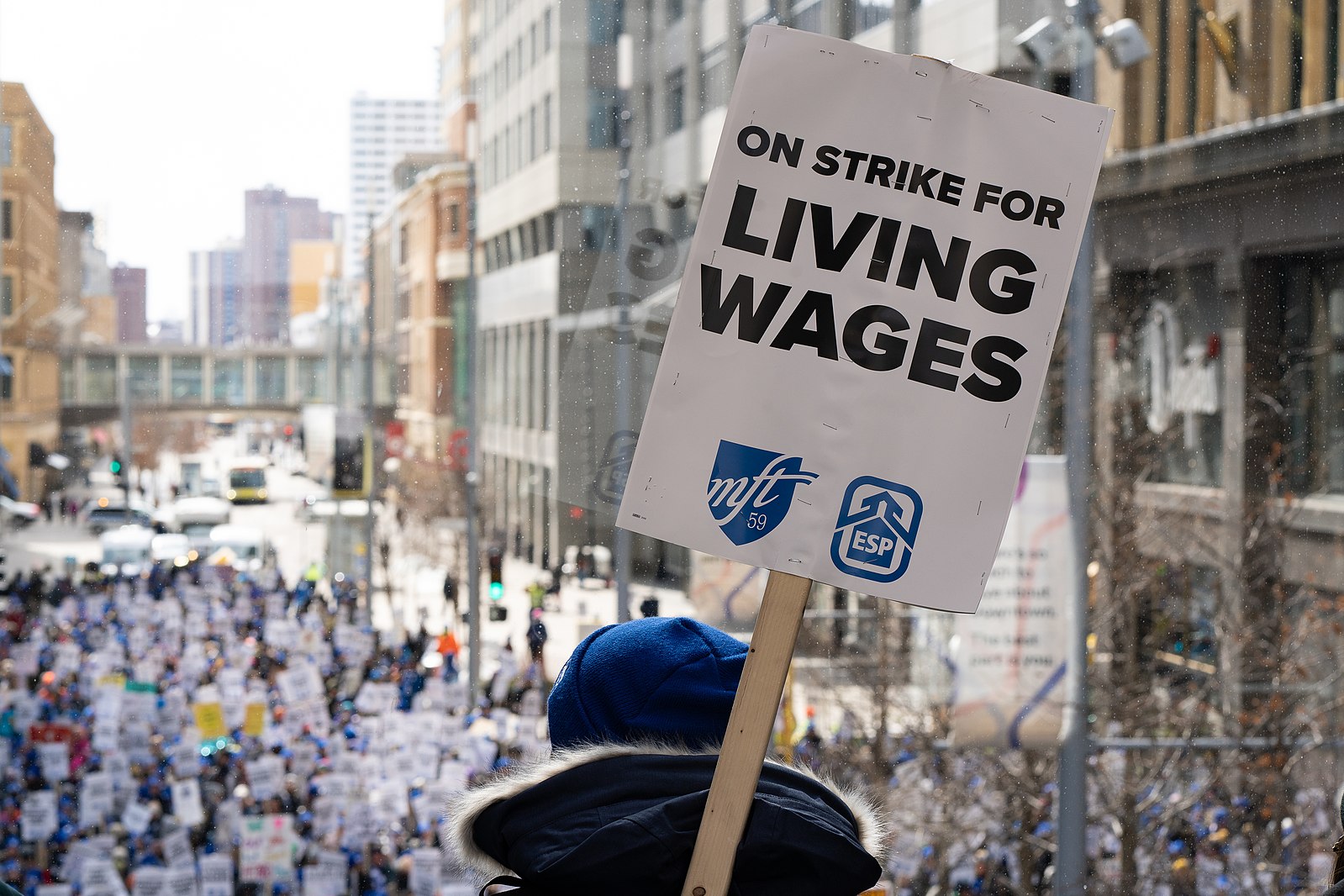
Holden Hopkins is a student at Harvard Law School.
In today’s news and commentary, thousands of Minnesota workers vote to authorize coordinated strikes and several Southern states consider changes to wage and child labor laws.
Over 13,000 workers in the Twin Cities have voted to authorize coordinated strikes in early March if unable to reach new contract agreements with their employers. Four unions, which variously represent janitors, security guards, teachers, and nursing home and public works employees, have voted to join the strike so far. This news represents the culmination of a strategy begun ten years ago, when SEIU Local 26 leaders began lining up the expiration dates for represented workers’ contracts. Now, other unions with contracts expiring around the same time, including LIUNA Local 363, the Saint Paul Federation of Educators, SEIU Healthcare Minnesota & Iowa, and UFCW Local 663 have joined the original “What Can We Win Together?” campaign. SEIU Local 26 lists the stated goals of the campaign as decent work, good schools, stable housing, and a livable planet. The Minneapolis Federation of Teachers is also a member of the campaign, but has not authorized a strike.
The use of aligned contract expiration dates to amplify the power of simultaneous strikes is reminiscent of UAW President Shawn Fain’s call for a May 1, 2028 general strike, albeit on a smaller scale.
On Thursday, the Kentucky House of Representatives approved a repeal of state child labor laws. Current Kentucky law limits children aged sixteen and seventeen to six hours a night on school days, eight hours a day on non-school days, and thirty hours a week during school weeks, among other protections. The bill passed 60-36 despite objections from Democrats and some Republicans. Proponents of HB 255 claim it addresses the “national labor crisis” and removes barriers to necessary employment, while opponents worry it opens the door to further exploitation in low-wage industries. Those opposed to the bill also raised concerns about provisions which they say could make it harder for state investigators to enforce federal child labor laws or allow the employment of children in dangerous occupations.
HB 255 now heads to the Kentucky Senate, where Republicans hold thirty-one of thirty-eight seats. If it passes that chamber, it will go to Democratic Governor Andy Beshear, who has voiced his disapproval of the legislation.
On Friday, the Virginia General Assembly sent a bill to the desk of Governor Glenn Youngkin which would raise the state minimum wage from $12 an hour to $15 an hour by 2026. Two identical bills passed in both the House of Delegates and Senate along party lines with Democrats backing the legislation. Youngkin, a Republican, is expected to veto the legislation. While Democrats control both chambers by slim margins, they would not be able to overcome a veto without some cross-party support.
Finally, Major League Baseball has petitioned Arizona for an exemption from that state’s minimum wage laws. Last year, the MLB and the Major League Baseball Players’ Association reached a collective bargaining agreement establishing wages for minor league players which are below the minimum wage Arizona voters approved in 2016. Arizona is currently the host of the “Cactus League”, one of two sites along with Florida’s “Grapefruit League”, that host MLB preseason games. Florida Governor Ron DeSantis signed similar legislation to that requested by the MLB from Arizona in 2023. However, the MLB appears less likely to receive such an exception from Arizona. Laws passed by voters in Arizona require a three-fourths vote in the House and Senate to amend. Despite apparent willingness on behalf of Republicans, who hold slim majorities in both chambers, that three-fourths bar is likely out of reach without significant Democratic support—something legislators from that party have appeared reluctant to give.






Daily News & Commentary
Start your day with our roundup of the latest labor developments. See all
July 11
Regional director orders election without Board quorum; 9th Circuit pauses injunction on Executive Order; Driverless car legislation in Massachusetts
July 10
Wisconsin Supreme Court holds UW Health nurses are not covered by Wisconsin’s Labor Peace Act; a district judge denies the request to stay an injunction pending appeal; the NFLPA appeals an arbitration decision.
July 9
In Today’s News and Commentary, the Supreme Court green-lights mass firings of federal workers, the Agricultural Secretary suggests Medicaid recipients can replace deported farm workers, and DHS ends Temporary Protected Status for Hondurans and Nicaraguans. In an 8-1 emergency docket decision released yesterday afternoon, the Supreme Court lifted an injunction by U.S. District Judge Susan […]
July 8
In today’s news and commentary, Apple wins at the Fifth Circuit against the NLRB, Florida enacts a noncompete-friendly law, and complications with the No Tax on Tips in the Big Beautiful Bill. Apple won an appeal overturning a National Labor Relations Board (NLRB) decision that the company violated labor law by coercively questioning an employee […]
July 7
LA economy deals with fallout from ICE raids; a new appeal challenges the NCAA antitrust settlement; and the EPA places dissenting employees on leave.
July 6
Municipal workers in Philadelphia continue to strike; Zohran Mamdani collects union endorsements; UFCW grocery workers in California and Colorado reach tentative agreements.